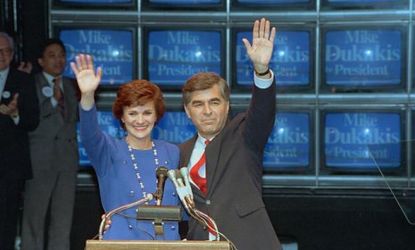28 years of Super Tuesdays: A timeline
On March 6, the political world will obsess over the eighth Super Tuesday in modern history. Here's how this pivotal juncture has transformed races before

Since 1984, "'Super Tuesday' has usually played a pivotal role in determining presidential nominees in both parties," says CNN's Peter Hamby. This year's Super Tuesday almost certainly won't end the topsy-turvy Republican presidential race, but with 10 states holding primaries and caucuses on March 6, and 437 total delegates at stake, it's by far the race's biggest event yet. Typically, three weeks separate the New Hampshire primary and Super Tuesday, says Nate Silver at The New York Times. This year they are "a full eight weeks apart," which allowed time for plenty of unpredictable twists. As the four Republican candidates prepare for their big day, here's a look at how the drama unfolded on previous Super Tuesdays:
March 13, 1984
Nine states participated in the inaugural Super Tuesday: Alabama, Florida, Georgia, Hawaii, Massachusetts, Nevada, Oklahoma, Rhode Island, and Washington. Former Vice President Walter Mondale and Sen. Gary Hart (D-Colo.) were fighting for the chance to face incumbent President Ronald Reagan. Hart won seven states, but Mondale's campaign manager had "spent much of the 48 hours prior to Super Tuesday telling reporters Georgia was the key state up for grabs," says Richard A. Lee at Newsroom New Jersey. So when Mondale won Georgia, "the press declared him reborn," says Steve Kornacki at the New York Observer. Mondale rebounded and ended up tied with Hart at the Democratic convention, where party leaders tipped the balance to Mondale. Reagan went on to win the general election in a 49-state landslide.
Subscribe to The Week
Escape your echo chamber. Get the facts behind the news, plus analysis from multiple perspectives.

Sign up for The Week's Free Newsletters
From our morning news briefing to a weekly Good News Newsletter, get the best of The Week delivered directly to your inbox.
From our morning news briefing to a weekly Good News Newsletter, get the best of The Week delivered directly to your inbox.
March 8, 1988
Southern Democrats tried to boost the region's influence by holding their primaries on the same day. Instead, a Northern liberal, Massachusetts Gov. Michael Dukakis, won eight of of the 21 Super Tuesday contests (including his home state, Florida, and Texas) and, eventually, the nomination. The rest of the states split roughly by region, with Sen. Al Gore winning the upper South (Tennessee, Arkansas, Kentucky, North Carolina, Oklahoma), Rev. Jesse Jackson sweeping the Deep South, and Rep. Richard Gephardt winning his home state of Missouri. The moral is that "it's almost impossible for a party to bring order and structure" to the nominating schedule, DNC chief Don Fowler, a Super Tuesday opponent, told PBS News at the time.
March 10, 1992
This time around, "Southern Democratic leaders achieved... what they sought in vain to do" in 1988, said R.W. Apple in The New York Times, giving "a mighty heave forward to the presidential bid of a moderate candidate from their own region," Arkansas Gov. Bill Clinton. Clinton swept the South, including Florida, roaring back from earlier losses and dealing a fatal blow to his main rival, former Sen. Paul Tsongas (Mass.). At the same time, incumbent President George H.W. Bush lost up to 35 percent of the GOP Super Tuesday voters to conservative rival Pat Buchanan, putting Bush "closer to the nomination, in a numerical sense, but no closer to party mastery," Apple noted.
Sign up for Today's Best Articles in your inbox
A free daily email with the biggest news stories of the day – and the best features from TheWeek.com
March 12, 1996
Senate Majority Leader Bob Dole (R-Kan.) vanquished his GOP rivals, including Buchanan and publisher Steve Forbes, with a sweep of all seven Super Tuesday states, putting him on a clear path to face the incumbent President Clinton. Forbes dropped out the next day.
March 7, 2000
Vice President Al Gore and Gov. George W. Bush (Texas) both sealed their nominations on Super Tuesday. Gore won all 11 states, including the home state (Missouri) of challenger Sen. Bill Bradley (N.J.), plus New York, where Bradley had been a basketball star for the Knicks. Bradley dropped out right away. Bush's primary opponent, Sen. John McCain fared better than Bradley, winning primaries in Vermont, Connecticut, Massachusetts, and Rhode Island. But Bush's big wins in states like California, New York, and Ohio ended McCain's run. "Super Tuesday 2000 accomplished exactly what the fixers designed it to do, by enabling the two party establishment favorites to rack up emphatic wins," said Martin Kettle in Britain's The Guardian.
March 2, 2004
Seven states abandoned Super Tuesday en masse for an earlier date, Feb. 3, in an attempt to gain more influence in the nominating process. Sen. John Kerry (Mass.) performed well on "Mini Tuesday," but it wasn't until the official Super Tuesday, when he won nine out of 10 contests, that he forced his last rival, Sen. John Edwards (N.C.), from the race. Kerry's early, convincing lockup of the nomination kicked off a record eight-month general election fight against incumbent President George W. Bush. Because the Democrats "fell over themselves to be nice to each other in debates," said The Economist, there were "neither ideological rifts to heal nor exaggerated taunts to forget." Bush's approval ratings were dangerously low, and Democrats were remarkably united and excited. But in November, Kerry narrowly lost.
Feb. 5, 2008
Two dozen states abandoned the traditional March Super Tuesday and moved their primaries and caucuses up to Feb. 5. That proved decisive for McCain, as his haul (nine states, 602 delegates) forced main rival Mitt Romney (seven states, 201 delegates) from the race a few days later. On the Democratic side, things were much murkier. Barack Obama won 13 of the 22 Democratic contests to Hillary Clinton's nine, but Clinton won crucial delegate-rich states like California, New York, and Massachusetts, blunting Obama's momentum and setting up the famous long slog for delegates. The early "inevitable" candidate, Clinton was so sure she'd "have the nomination wrapped up by Super Tuesday" that she "spent every penny she had raised" by Feb. 5 and failed to organize much in post–Super Tuesday states, says Richard Dunham in the Houston Chronicle. She never recovered from that "colossal miscalculation."
Sources: CBS News, CNN (2), Economist, Guardian (2), Houston Chronicle, New Jersey Newsroom, New York Times (2,3), PBS (2), Wikipedia (2,3)
-
 US election: who the billionaires are backing
US election: who the billionaires are backingThe Explainer More have endorsed Kamala Harris than Donald Trump, but among the 'ultra-rich' the split is more even
By Harriet Marsden, The Week UK Published
-
 US election: where things stand with one week to go
US election: where things stand with one week to goThe Explainer Harris' lead in the polls has been narrowing in Trump's favour, but her campaign remains 'cautiously optimistic'
By Harriet Marsden, The Week UK Published
-
 Is Trump okay?
Is Trump okay?Today's Big Question Former president's mental fitness and alleged cognitive decline firmly back in the spotlight after 'bizarre' town hall event
By Harriet Marsden, The Week UK Published
-
 The life and times of Kamala Harris
The life and times of Kamala HarrisThe Explainer The vice-president is narrowly leading the race to become the next US president. How did she get to where she is now?
By The Week UK Published
-
 Will 'weirdly civil' VP debate move dial in US election?
Will 'weirdly civil' VP debate move dial in US election?Today's Big Question 'Diametrically opposed' candidates showed 'a lot of commonality' on some issues, but offered competing visions for America's future and democracy
By Harriet Marsden, The Week UK Published
-
 1 of 6 'Trump Train' drivers liable in Biden bus blockade
1 of 6 'Trump Train' drivers liable in Biden bus blockadeSpeed Read Only one of the accused was found liable in the case concerning the deliberate slowing of a 2020 Biden campaign bus
By Peter Weber, The Week US Published
-
 How could J.D. Vance impact the special relationship?
How could J.D. Vance impact the special relationship?Today's Big Question Trump's hawkish pick for VP said UK is the first 'truly Islamist country' with a nuclear weapon
By Harriet Marsden, The Week UK Published
-
 Biden, Trump urge calm after assassination attempt
Biden, Trump urge calm after assassination attemptSpeed Reads A 20-year-old gunman grazed Trump's ear and fatally shot a rally attendee on Saturday
By Peter Weber, The Week US Published


